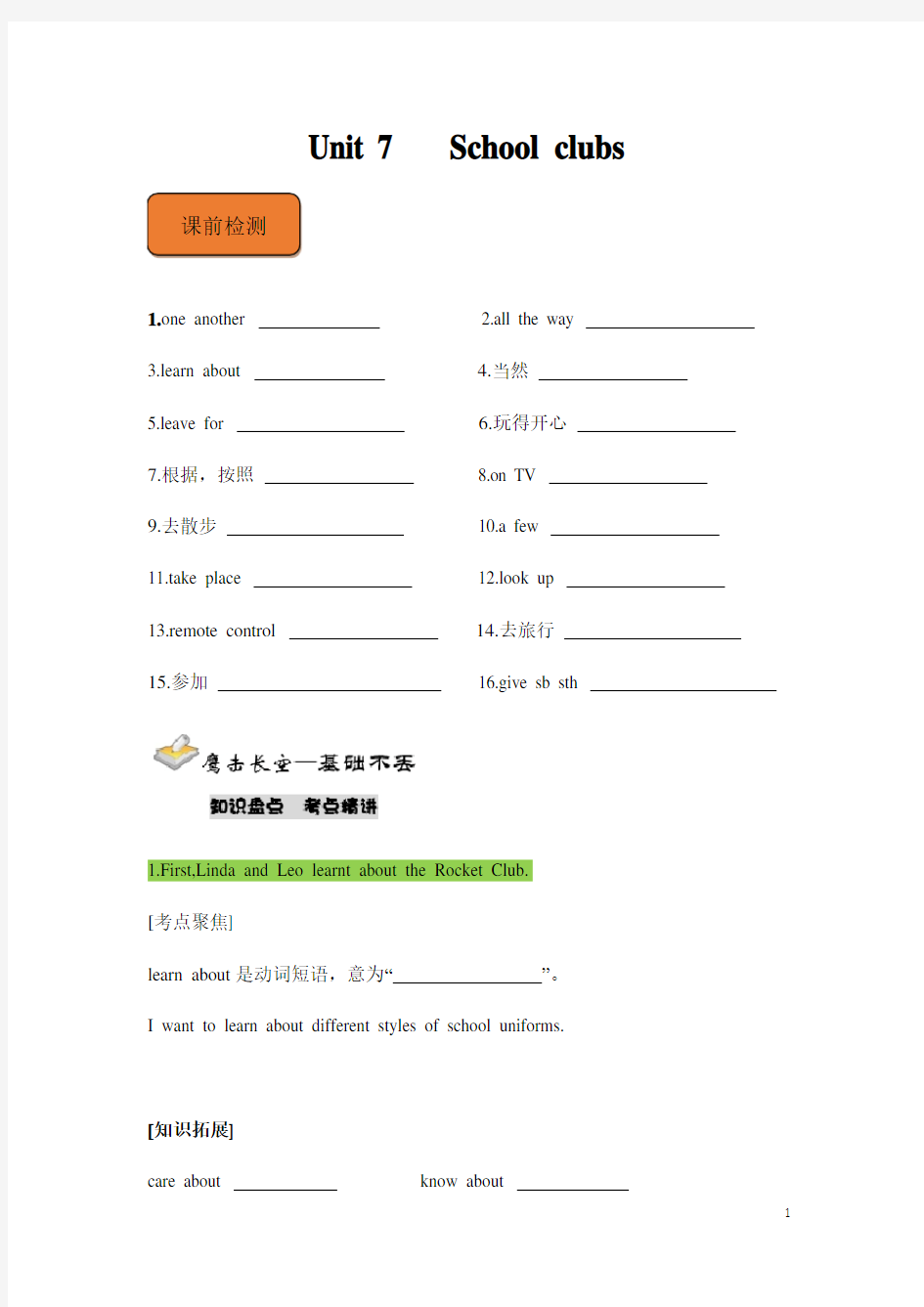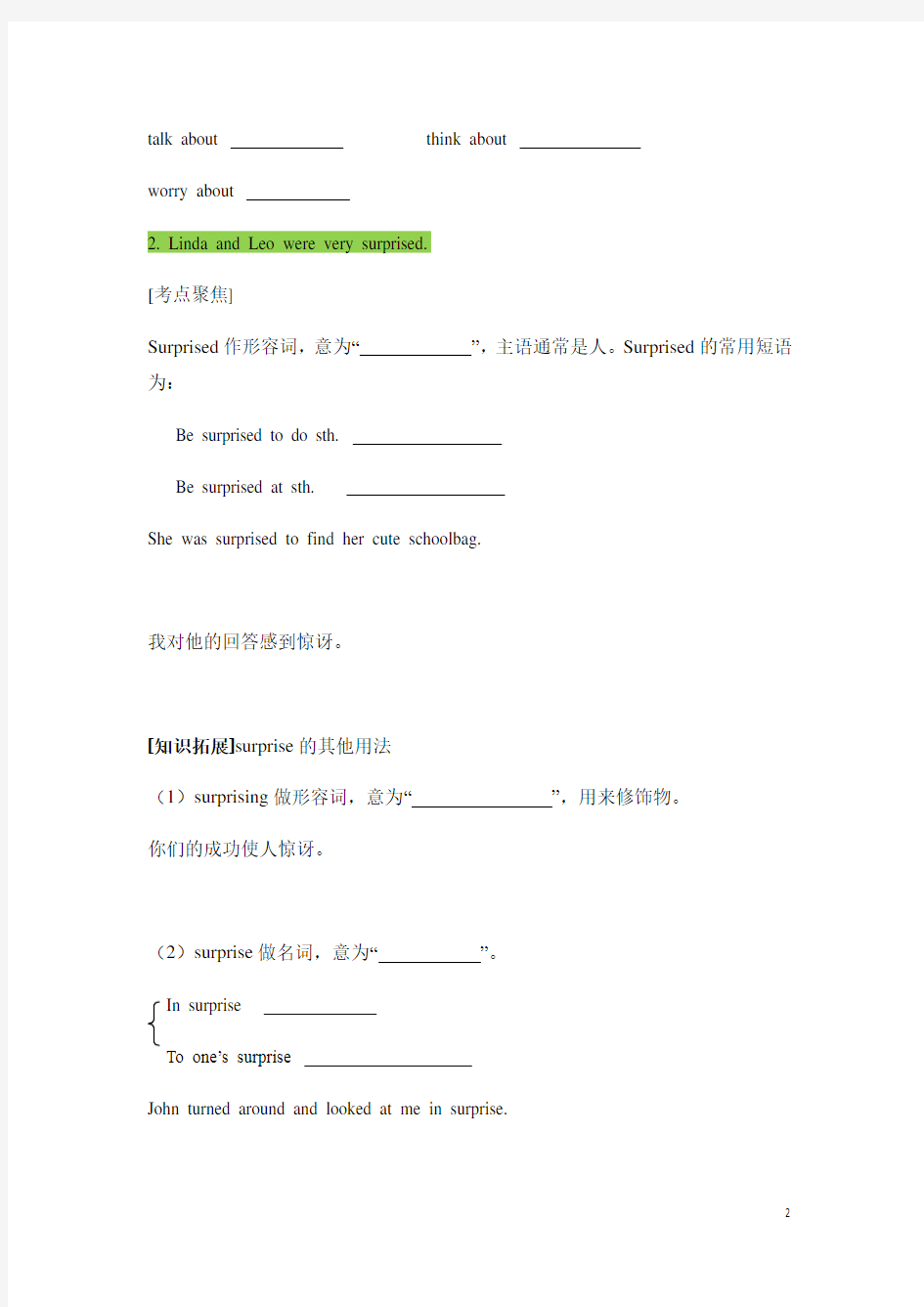

Unit 7 School clubs
1.one another
2.all the way
3.learn about
4.当然
5.leave for
6.玩得开心
7.根据,按照
8.on TV
9.去散步10.a few 11.take place 12.look up 13.remote control 14.去旅行15.参加16.give sb sth
1.First,Linda and Leo learnt about the Rocket Club.
[考点聚焦]
learn about是动词短语,意为“”。
I want to learn about different styles of school uniforms.
[知识拓展]
care about know about
talk about think about
worry about
2. Linda and Leo were very surprised.
[考点聚焦]
Surprised作形容词,意为“”,主语通常是人。Surprised的常用短语为:
Be surprised to do sth.
Be surprised at sth.
She was surprised to find her cute schoolbag.
我对他的回答感到惊讶。
[知识拓展]surprise的其他用法
(1)surprising做形容词,意为“”,用来修饰物。
你们的成功使人惊讶。
(2)surprise做名词,意为“”。
In surprise
To one’s surprise
John turned around and looked at me in surprise.
使我们惊奇的是,这个男孩获奖了。
1.—______ do you brush your teeth?—Once a day.
A.How often
B.How soon
C.How long
D.How many
2.Please ______ the light. It’s getting dark.
A.switch on
B.switch off
C.turn off
D.turn down
3.I enjoy ______ my school friends.
A.see
B.to see
C.seeing
D.saw
4.—Can you tell me why you want to ______ the Space Club?
—Well, because I want to ______ space.
A.join in;throw away
B.join;learn about
C.go into;light up
5.The______ show on Zhejiang TV, Running Men, makes lots of people______.
A.interesting;relaxing
B.interesting;relaxed
C.interested;relaxed
6.Anna is going on a tour of xi’an,and she wants to Chinese history.
A.dream of
B.learn about
C.look through
D.pass on
7.Our school lost the game yesterday.All of us were at the result of the game.
A.surprise
B.surprising
C.surprised
D.to surprise
根据汉语意思完成句子,每空一词
1.你学习过摄影吗?
Did you______ ______ photography?
2.回家的一路上,他没对我说一句话。
He didn’t speak a word to me ______ ______ ______ back home.
3.“你会弹吉他吗?”“当然。我从5岁开始弹。”
—Can you play the guitar?
—______ ______. I began to play it when I was five.
4.我找不到电视机的遥控器了。
I can’t find the ______ ______ of the TV.
5.你能帮我从词典中查找一下这个词吗?
Can you help me______ ______ the word from the dictionary?
3.Will it go all the way into space?
[考点聚焦]
All the way为固定短语,意为“”,常在句中做状语。
He stayed all the way in the game.
[知识拓展]
In this way in the way
On the way by the way
4.I’m sorry to hear that.
[考点聚焦]
“I’m sorry to hear that”多用于情景交际中,用在听说别人生病,发生事故等不好消息时,对别人的不幸遭遇表示惋惜,难过以及遗憾等。
听说你没有通过这次英语考试,我很难过。
—I have a bad headache.
—I’m sorry to hear that.
5.Look them up in the library.
[考点聚焦]
Look up意为“”。若名词做宾语,名词置于look up 中间或后面均可;若代词做宾语,则代词置于look与up中间。
你应该在词典里查一查这些词。
如果你不认识这个单词,你最好在词典里面查一下它。
[知识拓展]
Look at look for
Look after look over
Look like look through
6.When we were all there,we left for Lucky Island.
[考点聚焦]
Leave for意为“”,其后常接地点名词。
下个月我们要动身去重庆。
Leave from…意为“”。
我明天准备离开户县。
1.—I need to ______ some information on the Internet. Could I use your computer? —Of course.
A.look at
B.look down
C.look up
D.look out
2.—I overslept this morning,so I ran school.
A.all the way to
B.by the way to
C. the all way to
D.all way
3.After she finished the story,Alice wrote a review for her school newspaper.
A.read
B.reads
C.to read
D.reading
4.—I don’t know the new word.
—It doesn’t matter.You can in the dictionary.
A.look up it
B.look it up
C.look for it
D.look it for
5—My car .Could you please give me a ride tomorrow?
—I’m sorry I can’t.I’m London tomorrow.
A.is new;leaving
B.has broken down;leaving for
C.broke;leaving for
D.is expensive;leaving
6.—I’m feeling terrible!I have a bad cold.
—.You’d better see a doctor at once.
A.I’m afraid not
B.Sorry to hear that
C.Sounds great
D.You’re right
7.My mother usually talks with her friends ______ home.
A.on the way
B.by the way
C.in the way
D.at the way
用所给单词的适当形式填空
1.Our Art teacher showed us how ______(draw)a nice picture.
2.An old lady found my sunglasses and gave them back to ______(I).
3.He is going to join the ______(hike)Club next month.
4.Jane visited her grandparents in Nanjing two ______(week)ago.
5.My mother taught me ______(make)dumplings last Sunday.
6.Linda asks her father ______(give)some food to these little cats.
7.Finally it was time to go home.
[考点聚焦]
“It’s time to do sth”相当于“It’s time for sth”,表示“”,句子当中的to是动词不定式符号,后接动词原形,for是介词,后接名词。
I t’s time to go to school.
= .到上学的时间了。
是时候写英语作业了。
It’s time for sb to do sth.
It’s the + 序数词+ time + that从句
到你起床的时间了。
这是他第一次去青海。
[考点聚焦]
[注意]
a few和few+可数名词复数;
little, a little +不可数名词(有a则有,无a则无)There is a few books in my room.
I have little money,so I must stay at home,
9.a girl from another club shouted.
[考点聚焦]
1.Yesterday I had a piece of beef, vegetables and ______ for dinner.
A.some rice
B.a few rice
C.a little rices
D.a rice
2.Jim is always so busy ______ he has little time for his family.
A.if
B.until
C.that
D.which
3.We can’t do it that way—but whether it will work is ______ matter.
A.other
B.another
C.each
D.every
4.Bob can play ______ tennis but can’t play ______ violin.
A.the;the
B./;/
C.the;/
D./;the
5.—Can your sister sing?
—______.
A.Yes, he can
B.Yes, he does
C.No, she doesn’t
D.Yes, she can
6.—My daughter Kate doesn’t like the colour of this skirt. Can you show her______ one?
—OK!
A.others
B.the other
C.another
7.It’s time ______ supper.
A.have
B.to have
C.having
D.had
8.Mary is ______ young ______ she can’t go to school.
A.so;that
B.such;that
C.too;to
D.so;for
9.The film is very ______, so I wouldn’t like to see it.
A.interesting
https://www.doczj.com/doc/8d12492402.html,eful
C.boring
D.bored
10.It’s 9;30 P.m,children! is time to go to bed.
A.That
B.It
C.Thos
D.They
11.My mother is ______ English teacher in ______ middle school.
A.a;an
B.an;an
C.an;a
D.a;a
12.He has much money, ______ he is not happy at all.
A.and
B.but
C.so
D.because
根据汉语意思完成英语句子,每空一词
1.你能告诉我怎么到达博物馆吗?
Can you tell me ______ ______ ______ ______ the museum? 2.“那真是令人惊奇!”她说。
“______ ______ ______!”she said.
3.昨天雨下得如此大以至于我们只好留在家里。
The rain was ______ ______ ______ we had to stay at home yesterday.
4.前一天晚上他坐火车去了北京。
He went to Beijing by train ______ ______ ______.
5.去冒险是一件令人兴奋的事情。
It is an exciting thing to ______ ______ ______ ______.
用所给单词的适当形式完成句子
1.The boy felt ______(surprise)when he didn’t see his books on the desk.
2.Tom and his brothers went to play in the park and enjoyed ______(they).
3.Children, it’s time ______(go)to bed.
4.The movie is ______(bore). I don’t like to watch it.
5.Look, Mom. There are three beautiful ______(butterfly)among the flowers.
Grammar
一、一般过去时:过去某个时间发生的动作或存在的状态。用动词的过去式来表示,用be(was,were)动词的过去式表示过去的状态。
二、通常使用一般过去时的时间状语
(1)yesterday,the day before yesterday,two days ago…ago (一段时间+ago),the other day,this morning
(2)last night (week 、Sunday 、month、winter、year、)
(3)just now,at the moment ,at the age of ,one day ,once upon a time 、long long ago
三、行为动词的一般过去式
行为动词是指表示具体动作的动词,如play, watch, eat等,它们的过去式表示这个动作发生在过去的某一时间。
We played basketball yesterday.
1、行为动词的过去式的构成:可概括为“直、去、双、改”四字诀。
①一般情况下在动词原形后直接加ed. 如watched, played.
②以不发音的字母e结尾的动词,去掉e再加ed.如hoped, lived.
③重读闭音节结尾且末尾只有一个辅音字母,须双写最后一个辅音字母,再加ed.
如stopped, dragged, dropped, planned, chatted, kidded, begged, regretted, controlled, admitted, occurred, preferred, referred, permitted, equipped等.
2.行为动词在一般过去时态的句子中的用法
(1)肯定句:谓语动词要用过去式时,行为动词的过去式没有人称和数的变化;
肯定句为:
I went home at nine o'clock yesterday.
They watched TV last night.
②改为否定句时,要把谓语动词改为“didn’t+动词原形”;
否定句:
I didn't go home yesterday.
They didn’t watch TV last night.
③改为一般疑问句时,在句首加助动词did,句中的动词要改为动词原形。
一般疑问句:
Did you go home yesterday?
Did they watch TV yesterday?
肯定回答:Yes,I did. Yes, they did.
否定回答:No,I didn't. No, they didn’t.
④特殊疑问句:
When did they go home?
When did they watch TV?
四、be动词的一般过去时
1.be动词过去式的构成
①be动词的过去式表示过去的状态,如是什么,在哪里,怎么样等。
I was twelve last year.
②当主语是第一人称单数或第三人称单数时,谓语动词用was
③主语是第二人称或其他人称复数时,谓语动词用were.
2.be动词在一般过去时态的句子中的用法。
①在肯定句中:(在人称和数上与主语保持一致)
I was late yesterday.
They were in Beijing last week.
②否定句:
We weren't late yesterday.
They weren’t/ were not in Beijing last week.
③疑问句:
Were you ill yesterday?
Were they in Beijing last week?
肯定回答:Yes,I was. Yes, they were.
否定句:No,I wasn't. No, they weren’t.
④特殊疑问句:
When were you born?
Where were they last week?
五、一般过去式的主要用法
(1)一般过去时表示在过去某个时间发生的动作或存在的状态一般过去时不强调动作对现在的影响,只说明过去的事情。
My father worked in Shanghai last year.
It was hot yesterday.
Lei Feng was a good soldier.
(2)也可以表示过去经常或反复发生的动作,常与always, often, never等连用。
①I often went to school on foot.(过去)我经常步行去上学。
②Mrs. Peter always carried an umbrella. 彼得太太过去老是带着一把伞。
(只是说明她过去的动作,不表明她现在是否常带着伞。)
比较1 Mrs. Peter always carries an umbrella. 彼得太太老是带着伞。
(说明这是她的习惯,表明她现在仍然还习惯总带着一把伞)比较2Mrs. Peter is always carrying an umbrella.
彼得太太总是带着一把伞。
(表示说话者对这一动作或行为厌烦)
③I never drank wine. 我以前从不喝酒。
(不涉及到现在,不说明现在是否喝酒)
(3)与when等连词引导的状语从句连用。
When we got home, we had a short rest.
He was reading books when his father came in.
1.He ______ to school 10 minutes ago.
A.went
B.go
C.goes
D.going
2.—You look very nice in your new dress today.
—Oh, really? I______it when it was on sale.
A.buy
B.bought
C.have bought
D.will buy
https://www.doczj.com/doc/8d12492402.html,st Christmas, Tommy’s father ______ him a new watch.
A.give
B.gave
C.to give
D.gives
4.—Hi, Carol. How was your trip to Disneyland?
—Hi, Alice. Oh, we______ a good time there.
A.have
B.has
C.had
D.are having
5.—Guess what!I saw Tom in London.
—Really?I ______ he was in Beijing.
A.think
B.was thinking
C.thought
D.am thinking
6.—Where did you go last weekend?
—I to the Great Wall.
A.go
B.went
C.will go
D.have gone
7.—Lin Kai,hand in your homework,please.
—Oh,sorry.I it at home this morning.
A.was leaving
B.has left
C.will leave
D.left
https://www.doczj.com/doc/8d12492402.html,st week Vivian a dress for her mother with her first-month salary.
A.buy
B.bought
C.will buy
D.would buy
9.—What your mother last Sunday,Mary?
—Sorry,I really can’t remember.
A.does;buy
B.is;buying
C.did;bought
D.did;buy
10.—How was your weekend?
—It was busy. I cooked the meals and for the math test.
A.studyed
B.studied
C.studies
D.syudy
11.—When ______ you ______ here?
—Two days ago.
A.did;come
B.have;come
C.will;come
D.do;come
12.—Has Mary ever visited Tower Bridge?
—Yes. She______it two years ago.
A.visits
B.visited
C.has visited
D.was visiting
用括号所给词的适当形式填空。
1.My uncle (send) a birthday present to me yesterday.
2.When (be) your born?
3.As soon as he arrived in Beijing,he (phone) me.
4.When I (knock) at his door,he was cooking.
5.We were watching TV when the light (go) out.
6.He said he (not like) maths at all.
7.Yesterday my mother ______(go) shopping in the supermarket.
8.He got up and______(hurry) to school without breakfast.
9.We enjoyed ______ (we)at the party last night.
10.Just now we saw some ______ (colour) birds in the garden.
https://www.doczj.com/doc/8d12492402.html,st week Linda______ (take) a lot of photos in the park.
12.They were so ______(excite) that they couldn’t sleep last night.
阅读能力提升与拓展
完型填空
Dear Jenny,
How’s it going?Are you busy with your study these days?
I’ve been back at school1nearly four weeks.I’m very glad to tell you that great
2have taken place in our school this term.First of all,we’re asked to “clear our plates”when having our m eals and say3to wasting.Some of us used to order more than what we could eat.That was a big waste of food.Now we need to4the food we order.We should also stop wasting in some other ways.For example,we should turn off the lights when we5the classroom.And our school has opened up some fields for us to learn how to grow vegetables.Each class is given a small garden and our class has decided to grow some tomatoes and beans(豆类)in our6time.I think that’ll be very interesting.Maybe I’ll be able to7you some beans we’ve grown by ourselves next time!What’s more,we have only two classes in the afternoon8we have more time for after-school activities.I’m one of the traffic safety volunteers in our school.After school,we take turns to go to the streets near our school and ask people to934the traffic rules.
I think we are having a different school life now!
Please write back soon and tell10more about your school.
Yours,
Wang Wei
1. A.in B.for C.on D.at
2. A.changes B.things C.interests D.lessons
3. A.yes B.hello C.no D.thanks
4. A.clean B.pay C.cook D.finish
5. A.leave B.reach C.open D.build
6. A.busy B.free C.happy D.sad
7. A.plant B.buy C.post D.lend
8. A.because B.when C.before D.so
9. A.follow B.make C.break D.think
10. A.him B.her C.you D.me
阅读理解
A
My grandfather Jack is 96 years old,and he has had an interesting life.He has travelled a lot in his life in the Far East.He visited the Taj Mahal in India and the Pyramids in Egypt.He hunted(狩猎)lions in Africa,and rode a camel in the Sahara Desert.He says the most beautiful place he has travelled to is Kathmandu in Nepal.
Jack has married twice.His first wife died when she was 32.He met his second wife Maria while he was cycling round France.They have been married for 50 years,and they have lived happily in a small village since they got married.
Jack says that he has never been ill in his life.The secret of good health,according to my grandfather,is exercise.He goes swimming every morning.He has done this since he was a boy.He also has a glass of wine every night!Perhaps that is his secret!
1.What kind of life has Jack lived?
A.A short life.
B.An interesting life.
C.A lonely life.
D.A poor life.
2.Which of the following does Jack think is the most beautiful place?
A.Kathmandu.
B.The Pyramids.
C.The Sahara Desert.
D.Taj Mahal.
3.How many times has Jack married?